In the past two months or more in 2018, according to the website of the General Administration of Quality Supervision, Inspection and Quarantine, as of March 5, there were 31 vehicle recalls filed this year, involving a total of 3,108,665 cars in 16 brands.
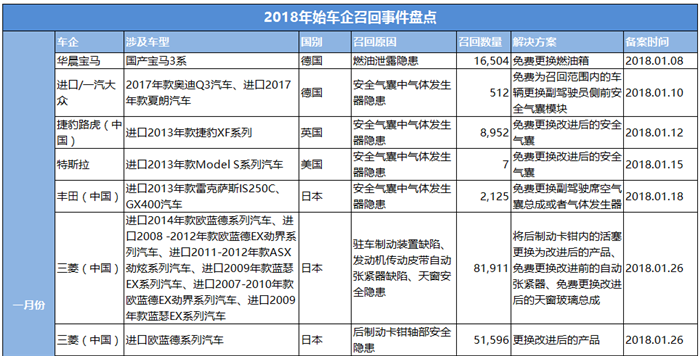
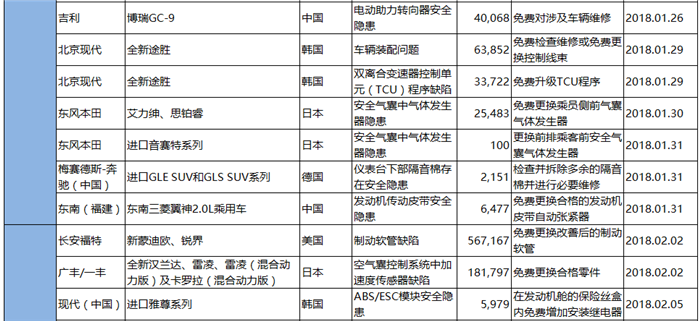
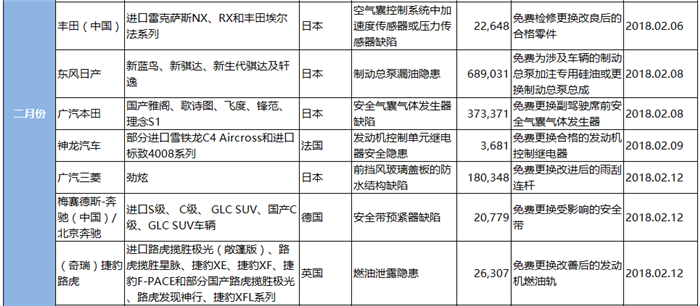
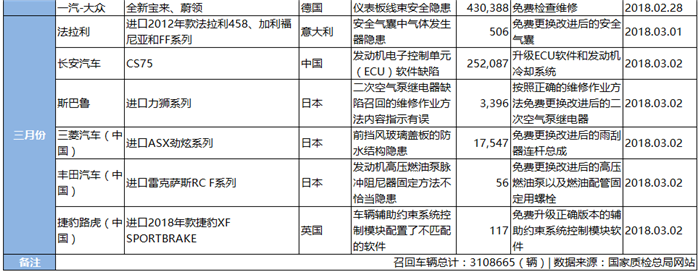
In these recalls:
First, the number of Japanese car recalls and the largest number
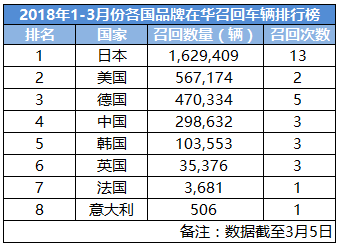
According to the data of the General Administration of Quality Supervision, Inspection and Quarantine, since January, Japanese cars have initiated 13 recalls in China, involving approximately 1.63 million vehicles for Nissan, Toyota, Mitsubishi, Subaru and Honda, which account for about 52% of the total recalled vehicles.
The American automotive brands ranked second in the recall volume recalled 567,000 vehicles, involving two brands, Ford and Tesla, of which Tesla only accounted for 7 vehicles, and Ford recalled an absolute proportion.
German car recalls are second only to Japanese cars, involving two brands, Volkswagen and Mercedes. German vehicle recalls are scattered, including hidden dangers of fuel leakage, hidden dangers of gas generators in airbags, potential safety hazards of soundproofing cotton in the lower part of the instrument panel, defects in seatbelt pretensioners, and safety hazards in dashboard wiring harnesses.
Second, the "airbag" has not stopped
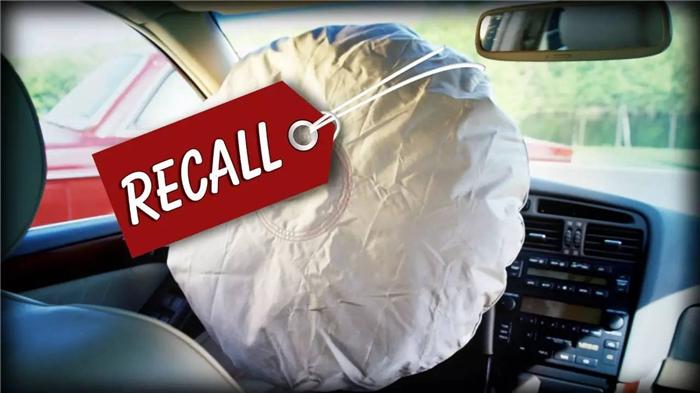
In 2017, the Japanese car had a very bumpy year. The scandals such as Takada Airbags, Kobe Steel, and Nissan Quality Inspection had a major impact on Japanese automakers' brands. Only the Takada Airbag scandal directly led Japanese cars to recall tens of millions of cars worldwide. .
However, in 2018, the aftermath of the "balloon" has not yet stopped. Among the 31 recalls filed by the General Administration of Quality Supervision, Inspection and Quarantine, 10 reasons for the recall were airbags, involving Germany, the United States, Britain, Japan and Italy. Car prices, a total of 615,000 cars.
Nissan Motors, the top-ranking vehicle manufacturer in China, recalled nearly 700,000 defective vehicles on February 8th. The reason for the recall is that some vehicles will cause brake fluid leakage in severe cases and cause brake force. Insufficient circumstances lead to longer braking distances and potential safety hazards.
Third, domestic cars (including joint venture brands) accounted for more than 92% of recalls
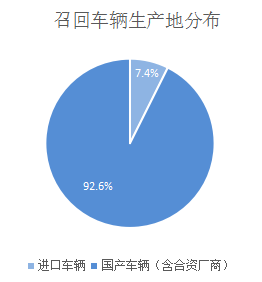
Among the more than 3.1 million recalled vehicles, domestic cars (including joint venture brands) accounted for nearly 2.88 million vehicles, accounting for about 92.6%; and the number of recalled cars was nearly 230,000, accounting for around 7.4%. The disparity between the recalls of domestic cars and imported cars is mainly related to their respective market shares, and the proportion of pure imported cars in the Chinese market is relatively small.
The number of recalls in January and February exceeded 650% in January
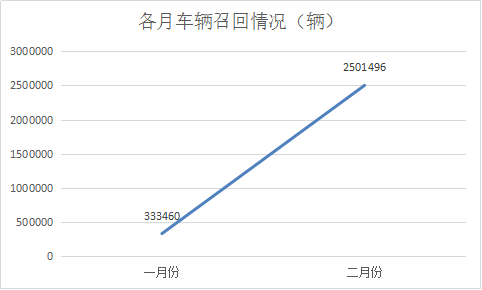
According to statistics, the number of recalled cars was 333,460 in January, and the average number of recalled cars was about 24,000. In February, 2,501,496 cars were recalled, an increase of more than 650% from the previous month. The average number of recalled cars was 228,000. About three of them, including Changan Ford, Guangzhou Automobile Honda and Dongfeng Nissan, recalled nearly 1.63 million vehicles.
In the past three years, the annual increase in the number of annual recalls of defective cars has exceeded 50%, of which the growth rate in 2017 compared to 2016 has reached 77%. Judging from the scale of the recall, the number of recalls in China has far exceeded the developed countries such as Germany, Britain, and Japan, ranking second only to the United States.
The recall of cars with safety hazards by automobile manufacturers is an important manifestation of the protection of consumer rights. Although China is at the forefront of the recall scale, it is inextricably linked with the size of China's huge auto market.
It is undeniable that China's current system of defective product recalls is still far behind the developed countries in Europe and America. Perfecting the recall system for defective products, increasing the intensity of defect investigations on production companies, and urging enterprises to fulfill their recall obligations still require the joint efforts of the government and all sectors.
The wood pellet mill is our patent product. It is vertical ring die type. It can make biomass pellets from various materials. Its design is mature and reliable. By Wood Pellet Machine, raw material is feeding vertically and directly in place, with stationary die and moving roller, the material is centrifugal and spread evenly around the die. The independent ejection device ensures the forming rate of pellet, the good design lowers the consumption and enhances the efficiency. It can work 24 hours and lubricate automatically. More than 200 wood pellet lines in and abroad have adopted this machine.
Wood Pellet Mill,Industrial Wood Pellet Mill,Commercial Wood Pellet Mill,Commercial Wood Pellet Mill
Shandong Kingoro Machinery Co., Ltd , https://www.sdkingoromachinery.com